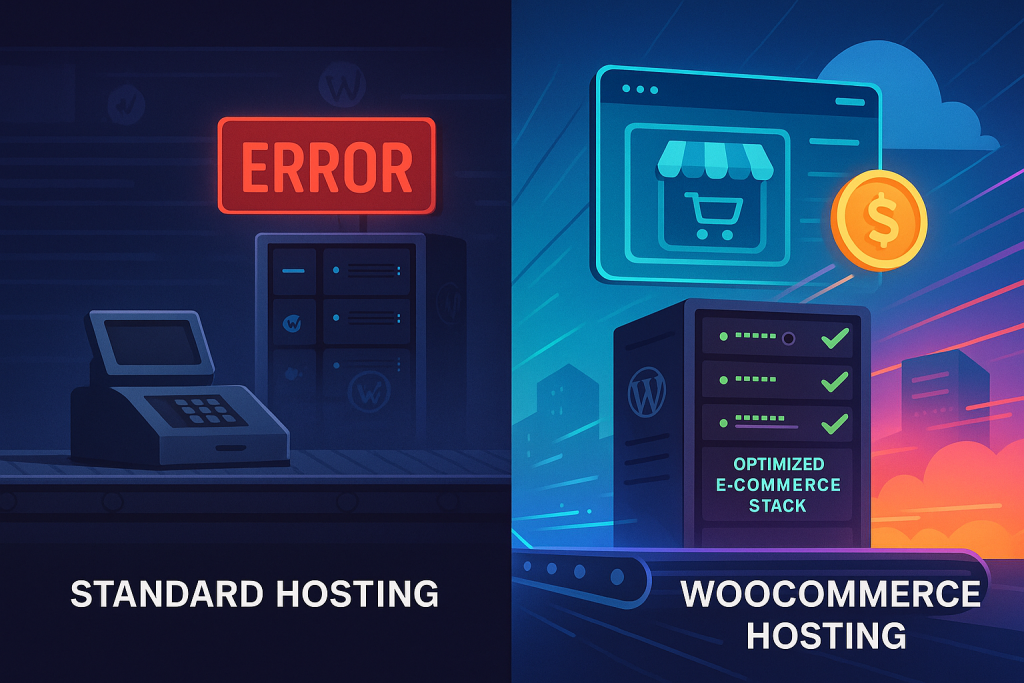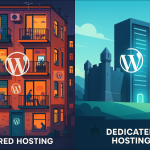When you decided to open an online store, you probably pictured a digital storefront where customers flock, products fly off the virtual shelves, and the cash register rings sweetly—a lot like a bustling high street shop, but open 24/7.
But here’s the cold, hard reality check that most new e-commerce entrepreneurs miss: Your online store is not just a website; it’s a living, breathing application that takes orders, processes payments, and manages inventory in real-time.
You wouldn’t open a physical shop on a side street with a constantly flickering “Open” sign, a cash register that jams every ten minutes, and a security guard who only shows up every other day, would you? Of course not.
Yet, this is exactly what happens when you run a powerful e-commerce platform like WooCommerce on the wrong kind of hosting.
This deep dive is for every person who’s ever thought, “Hosting is just hosting, right?” We’re going to break down exactly what WooCommerce hosting is, why it’s fundamentally different from “regular” web hosting, and how choosing the right one can be the single most important decision for your store’s survival and growth.
This isn’t a technical manual full of confusing jargon. This is a practical, easy-to-understand guide for the busy entrepreneur who just wants their store to be fast, safe, and open for business.
The Core Question: What Is WooCommerce Hosting?
Let’s start with a simple analogy.
Standard Web Hosting (like Shared Hosting) is a massive, general-purpose city bus. It can take you almost anywhere, and it’s super cheap because you share the seats, the space, the gas, and the driver with a hundred other people. It’s fine for a simple blog (a short trip to the post office), but you wouldn’t try to move a three-bedroom house with it.
WooCommerce Hosting (specifically Managed WooCommerce Hosting) is a specialized, armored delivery truck designed for high-value, time-sensitive cargo. It has a powerful engine for speed, a reinforced chassis for security, and a dedicated, expert driver who knows exactly how to handle fragile goods and rush-hour traffic.
In simple terms:
WooCommerce Hosting is a specialized web hosting environment that has been custom-built and pre-configured to handle the unique, heavy, and complex demands of an active online store running on the WooCommerce plugin (and WordPress).
It is a layer of optimization, security, and specialized support layered on top of a standard server to ensure the three S’s of e-commerce are met: Speed, Security, and Scalability.
The Two Crucial Differences: Why E-commerce Isn’t Just a Blog
To truly understand the “why,” you need to understand how an e-commerce store works compared to a static website (like a simple company brochure or a personal blog).
1. Dynamic vs. Static Content (The Speed Killer)
- A Blog/Static Website: Most of its pages (like the “About Us” page or a blog post) are static. The content rarely changes. A good host can take a snapshot of that page (a process called caching) and serve that saved copy to the next 1,000 visitors instantly. This is fast and easy.
- A WooCommerce Store: The content is constantly dynamic.
- The Home Page: Is the “Sale” banner showing? Is the inventory for the featured product updated?
- The Product Page: Is the correct price displaying? Is the stock level accurate?
- The Shopping Cart: This is the most complex. The cart page must be 100% unique to the user, tracking what they added, calculating taxes, and checking coupon codes—all in real-time. This cannot be cached in the same way. Every single action requires a fresh, heavy request to the server and the database.
The WooCommerce Hosting Solution: Optimized hosting uses smarter, adaptive caching that knows which parts of the site can be safely cached (like the main product image) and which parts must be live and fresh (like the cart or the “Add to Cart” button). This requires specialized server technology that standard hosting simply doesn’t have.
2. High-Value, Sensitive Data (The Security Risk)
- A Blog/Static Website: The only thing a hacker might steal is your latest blog post. Bad, but not catastrophic.
- A WooCommerce Store: You are storing:
- Customer Accounts: Names, addresses, phone numbers.
- Transaction Data: While the payment itself is handled by a gateway (like Stripe or PayPal), your server holds a record of the transaction.
- Business Assets: Your entire product catalog, pricing, and sales history.
The WooCommerce Hosting Solution: E-commerce security is non-negotiable. WooCommerce hosting includes essential features that go far beyond basic security, often required for PCI Compliance (the rules for handling payment card data):
- Pre-installed SSL Certificate: Encrypts all data between the user and your server.
- Web Application Firewall (WAF): A digital security guard that blocks malicious requests before they even hit your store.
- Proactive Malware Scanning: Not just once a week, but constant, automated checks for threats.
- Staging Environments: A safe, separate copy of your store where you can test new plugins or updates without risking the live site (a major benefit for e-commerce).
7 Ways WooCommerce Hosting is NOT Just Standard Hosting
To make the distinction crystal clear, let’s compare a typical Shared Hosting plan (the “city bus”) with a Managed WooCommerce Hosting plan (the “armored delivery truck”).
| Feature | Standard (Shared) Web Hosting | Managed WooCommerce Hosting | The Critical E-commerce Difference |
| Performance Stack | Generic LAMP/Litespeed setup. | Optimized for PHP/MySQL/Redis or Nginx (specific for Woo). | Faster processing of checkout and payment steps, preventing cart abandonment. |
| Caching | Basic page caching. Caches everything, which breaks carts. | Adaptive Caching (Object, Full-Page, Object). Knows not to cache the Cart or My Account pages. | Maintains speed while ensuring inventory and cart contents are always accurate. |
| Database Power | Standard, often slow, shared database limits. | High-Power, Tuned Database (often with dedicated resources). | E-commerce is database-heavy. Tuning prevents product searches and checkout processes from freezing. |
| Security | Basic SSL, shared firewall. User is responsible for most updates. | WAF, Proactive Malware Scans, DDoS Protection, Daily Backups. | Protects highly sensitive customer and payment data, building customer trust. |
| Support | General help (server up/down, password reset). Limited WordPress knowledge. | WooCommerce-Expert Support. They can troubleshoot plugin conflicts, payment gateway errors, and theme issues. | Saves hours of troubleshooting and reduces downtime, protecting revenue. |
| Installation | Requires manual installation of WordPress, then WooCommerce, then a theme. | One-Click Setup. WordPress, WooCommerce, and sometimes a theme/plugins are pre-installed and configured. | You focus on selling, not on complicated installation and setup. |
| Scalability | You hit a limit and your site slows down or crashes (requires a full migration to a new server type). | Built-in Scalability. Resources (CPU/RAM) can often be increased instantly to handle a big holiday sale or Black Friday traffic spike. | You can handle seasonal traffic surges without losing sales. |
The Hidden Costs of Choosing the Wrong Hosting
Many new store owners choose the cheapest shared hosting they can find because the price tag is attractive. They think they’re saving money, but they are actually incurring hidden costs that can kill a business before it starts.
1. The Cost of Slow Speed (Lost Sales)
In e-commerce, speed is money. Here are the facts:
- If your page takes more than 3 seconds to load, over 50% of your visitors will leave. They don’t wait for the product page to load; they go to your competitor.
- A 1-second delay in page response can result in a 7% reduction in conversions. (A $100,000/day store would lose $2.5 million a year in sales).
The Wrong Host’s Impact: A slow, under-powered server is the root cause of slow loading times. You lose sales because your hosting can’t process the requests fast enough, making all your marketing efforts pointless.
2. The Cost of Security Breaches (Lost Trust)
If your store is hacked, you lose more than just files.
- Customer Trust: News of a security breach spreads fast. Once customers believe their data is unsafe, they won’t return, and no amount of money can buy back that trust.
- Financial Penalties: You may be liable for the costs of notifying customers, legal fees, and regulatory fines if you failed to meet basic security standards.
The Wrong Host’s Impact: Standard hosting leaves too much of the security burden on you. A single missed update to a plugin or an unpatched server vulnerability can be the entry point for a devastating attack.
3. The Cost of Frustration (Lost Time)
Imagine trying to launch a new product, but your site is throwing a database error. You call support, but the agent knows nothing about WooCommerce’s payment gateways or how your theme interacts with your plugins.
- Wasted Time: You spend hours scouring forums, trying to fix a technical issue that an expert could have solved in minutes.
- Missed Opportunities: The product launch is delayed, the sale is missed, and your focus is pulled away from the core task of growing your business.
The Wrong Host’s Impact: You’re paying for “support” that isn’t actually specialized enough to help with e-commerce problems, turning a simple fix into a time-consuming nightmare.
A Simple Guide to Choosing Your WooCommerce Hosting Type
WooCommerce hosting isn’t one size fits all. It’s a category that covers a range of options, and your choice depends on your current store size and your future plans.
1. Managed WooCommerce Hosting (Best for Most)
- Who it’s for: Beginners, growing small-to-medium-sized businesses, and entrepreneurs who value time and simplicity over control.
- The Vibe: Everything is handled for you. The host manages the security, updates, backups, caching, and server optimization. You get a dashboard to manage your store, but all the complex tech stuff is hidden away.
- Key Benefit: Max speed and security with minimum effort. You get to focus 100% on marketing, products, and sales.
- Cost: Higher than shared hosting, but the value of the features and specialized support more than makes up for the difference.
2. Managed WordPress Hosting (A Good Runner-Up)
- Who it’s for: Stores that are still small, or people who need a slightly cheaper entry point than a dedicated “WooCommerce” plan, but still want managed service.
- The Vibe: The host manages your WordPress site, but they may not have all the specific WooCommerce optimizations (like advanced database tuning for product filtering). It’s a great start.
- Key Benefit: Excellent WordPress speed and security. You might have to manually install a few extra caching plugins to get optimal Woo performance.
- Cost: Generally sits between shared hosting and premium Managed WooCommerce hosting.
3. VPS or Dedicated Hosting (For Experts and Enterprise)
- Who it’s for: Large-scale e-commerce operations, stores with massive traffic (over 100,000 visitors/month), or users with deep technical skills.
- The Vibe: You have maximum power and control. You can customize the server environment down to the smallest setting.
- Key Benefit: Unmatched performance and full control.
- The Catch: This is usually unmanaged. You are the “dedicated expert driver” responsible for all the setup, maintenance, security patches, and troubleshooting. If you don’t know server administration, do not choose this option.
Final Verdict: Your Store Deserves Special Treatment
The moment you install the WooCommerce plugin, your website graduates from being a simple site to becoming a complex, revenue-generating machine. It starts handling money, managing logistics, and protecting customer data.
Treating it like a basic blog by putting it on a cheap, shared server is not a business-savvy move; it’s a risk you can’t afford to take.
The true value of dedicated WooCommerce Hosting is this:
It is the unseen foundation that lets your business thrive. It ensures that when a customer hits “Add to Cart,” the transaction is instant, secure, and accurate. It gives you back the countless hours you would have spent debugging errors, and it provides an iron-clad security barrier to protect your hard-earned reputation.
Your online store is not just a website. It is a business. Choose a hosting solution that treats it like one. If you are serious about selling, the specialized performance, security, and expert support of a proper WooCommerce Hosting plan is not an optional extra—it’s a necessary investment in your long-term success.



